Millions of people have been displaced following Russia’s invasion of Ukraine
in February 2022. Despite increasing concerns about the associated risks of
human trafficking and exploitation, evidence remains sparse. To address this
gap, and explore relevant experiences and perspectives, we co-convened an
international online roundtable together with the UK’s Independent AntiSlavery Commissioner. The roundtable addressed emergent issues, key concerns and recommendations, with a particular focus on the UK’s response to
people fleeing Ukraine. Over one hundred people from various professional
backgrounds including healthcare, lawyers, charities, law enforcement, policy makers and academics participated. Qualitative thematic analysis identified five major themes: 1) conflict can create and compound opportunities
for trafficking and exploitation; 2) the UK’s visa-based response to Ukrainian
refugees lacks clarity, resourcing and accountability; 3) information gaps and
overloads, both for people seeking sanctuary and those supporting them,
can exacerbate risks of trafficking and exploitation; 4) insecurity, fear and the
broader political climate around immigration and asylum create challenging
conditions to respond; and 5) longer-term strategic planning around displaced Ukrainians is vital but appears lacking. Here, we discuss the key
findings from the roundtable, situating them within the broader literature
and reflecting critically on their implications for evidence-gathering,
research, policy and practice.

